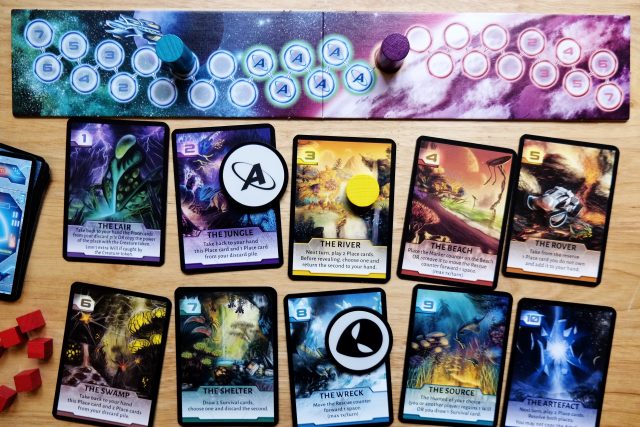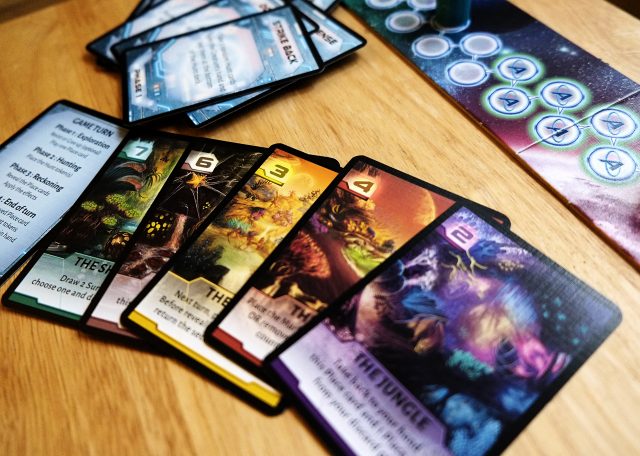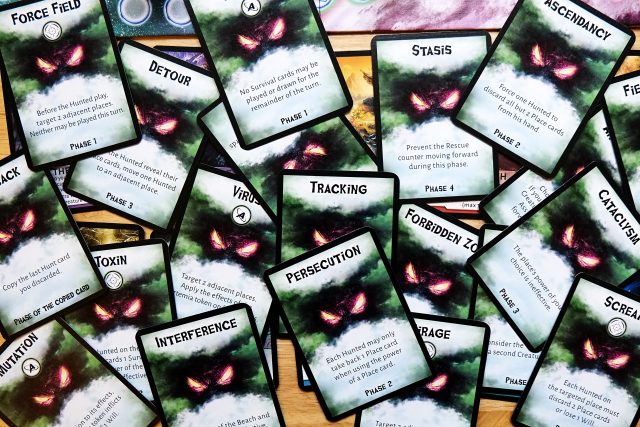I love it when social games have you really guessing – and in Not Alone’s case, you’re not trying to guess a hidden traitor, but you’re trying to guess.. “how can I avoid the terror of coming across a creature in the various environs of this planet?” A one-versus-many asymmetric card game with a spooky sci-fi tension to match any good horror movie, Not Alone had me intrigued from the moment I heard about it.
Like any good paranoia space sci-fi, it dumps a sorry team of humans on a planet (Artemia in this case) where they’re unaware just how doomed they are – and one player gets to take control of that dangerous element. As the creature, you’re trying to hunt the players down in a number of locations in order to assimilate them into Artemia’s ecosytem. Fun! As the group of stranded travellers (“the hunted”), you want to explore these locations without being caught, until help arrives and you can leave. The tricky part? Well, you can’t really discuss where to go, and where to hide from the creature – because the player in control of them is right there, dang it. Do you want to stick together for safety in numbers? Split up to see more locations and become a greater number of targets? You can try and bluff, but whatever the choice.. it’s a shot in the dark.
 So, how does this game of scary-alien-cat and defenseless-spacegoing-mice play out? On the mice – or “the hunted” – side of things, each player starts with a hand of location cards that match the first 5 locations in the game’s setup of 10. In the first phase of each round of the game, the hunted players each secretly pick a location card from their hand and place it face down. Before they reveal, the creature then places out “hunt tokens” – their basic location, plus any others that special hunt cards allow them to do. The hunted can’t change their selections once this happens, and there’s a certain dread when you’re watching the creature player deliberate on where to go. The hunted then reveal their locations, and players then resolve any actions of the locations they’re at, if they’re lucky enough to not have been caught! If the creature ends up on the same location as the hunted players, they’ll lose will – and the creature is a step closer to assimilating you all.
So, how does this game of scary-alien-cat and defenseless-spacegoing-mice play out? On the mice – or “the hunted” – side of things, each player starts with a hand of location cards that match the first 5 locations in the game’s setup of 10. In the first phase of each round of the game, the hunted players each secretly pick a location card from their hand and place it face down. Before they reveal, the creature then places out “hunt tokens” – their basic location, plus any others that special hunt cards allow them to do. The hunted can’t change their selections once this happens, and there’s a certain dread when you’re watching the creature player deliberate on where to go. The hunted then reveal their locations, and players then resolve any actions of the locations they’re at, if they’re lucky enough to not have been caught! If the creature ends up on the same location as the hunted players, they’ll lose will – and the creature is a step closer to assimilating you all.
For the hunted, each round is a delicate balance of figuring out if you should chance playing a card for a location you haven’t yet, or spending your will to bring locations back into your hand for more choice – and therefore, more ability to bluff the creature player. 5 locations to start with isn’t much: Lair, Jungle, River, Beach and Rover. Within those, there’s a decent variety of actions you can take that allow you to bring cards back into your hand, get further along the rescue track, or – key to speeding up your chance of survival – exploring the other 5 locations on Artemia to grow your deck’s size. If you don’t manage to successfully use the Rover (aka the creature captures you) it can be frustratingly slow to grow that deck – and slow along the rescue track because of that. You really have to be loose with your will to get locations back for flexibility – and the aforementioned bluffing of the creature. Of course, the more locations in the hunted players’ hands, the easier it is for them to spread out – however, not really being able to openly discuss and coordinate where you’re going to go can kill any strategy. You have to hope for the best – just like being stranded and scared out of your mind on an alien planet, not knowing where the creature will be next.
 If you’re playing the creature, when there are more players on the hunted team it’s easier to end up on whatever locations they choose because of this – sometimes unintended – spreading out over locations. Especially if you’re able to trap them in a way that narrows their ability to explore the new regions (cards 6 through 10). Not only are you trying to pop up wherever they are, you are looking to play hunt cards and tap into the weird power of Artemia. Hunt cards work in a number of phases of each round, and can range from being as basic as preventing the rescue track from moving, to preventing location powers working, or even forcing players to discard cards or will. It can get mean. Which is delightful as the creature, because you have so much power – but as the hunted it can feel like walls of peril closing in. The Hunted have a little chance to fight back with survival cards, a little bonus in addition to visiting locations for their perks – so, players could move the creature token, force the creature’s player to discard, tinkering with the rescue track and so on. There is hope…
If you’re playing the creature, when there are more players on the hunted team it’s easier to end up on whatever locations they choose because of this – sometimes unintended – spreading out over locations. Especially if you’re able to trap them in a way that narrows their ability to explore the new regions (cards 6 through 10). Not only are you trying to pop up wherever they are, you are looking to play hunt cards and tap into the weird power of Artemia. Hunt cards work in a number of phases of each round, and can range from being as basic as preventing the rescue track from moving, to preventing location powers working, or even forcing players to discard cards or will. It can get mean. Which is delightful as the creature, because you have so much power – but as the hunted it can feel like walls of peril closing in. The Hunted have a little chance to fight back with survival cards, a little bonus in addition to visiting locations for their perks – so, players could move the creature token, force the creature’s player to discard, tinkering with the rescue track and so on. There is hope…
Moving onto the less unexplained and unexplored – how the game looks and what’s in the box. There’s not much to this game, component wise – but the cards are decent quality as are all of the tokens and hunt poker chips are really nice! The player aid cards are handy, however I wish there had been a little more work put into the rulebook. While it does go over set up and the like pretty well, it could do with fleshing out info on the gameplay and cards more, and being clearer overall. At the core of the game, despite it being a fairly bare-bones card game, is the stunning art on the cards – the location cards, especially. Like the cross between a richly paletted Ridley Scott film and pulp sci-fi novel covers, the locations evoke an amazingly alien place that is terrifying and intriguing. I want this art in a game that goes beyond simple card play, and into a deeply rich thematic game, please!
 Not Alone takes the basic idea of a social, bluffing game and enhances it to a really cool level with the asymmetric play and the back and forth between the hunted and the creature. It feels like it hovers somewhere between One Night Ultimate Werewolf and Dark Moon for me – it’s got a delicious mix of bluffing, player interaction, simplicity of play (yet challenging once you’re in it) and secret dangers. Can you make it to the rescue pod without being assimilated?
Not Alone takes the basic idea of a social, bluffing game and enhances it to a really cool level with the asymmetric play and the back and forth between the hunted and the creature. It feels like it hovers somewhere between One Night Ultimate Werewolf and Dark Moon for me – it’s got a delicious mix of bluffing, player interaction, simplicity of play (yet challenging once you’re in it) and secret dangers. Can you make it to the rescue pod without being assimilated?
—
Not Alone is a card game that plays 2 – 7 people, in approximately 30 – 45 minutes. It is designed by Ghislain Masson, with art by Sebastian Caiveau. Originally published by Geek Attitude Games, it has a wider release through Stronghold Games. Thank you to Stronghold for providing a review copy for us to be assimilated by.
Comments
No comments yet! Be the first!